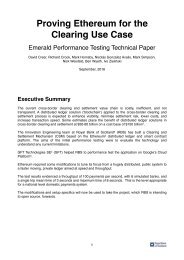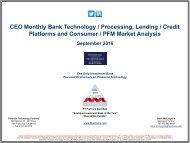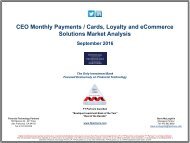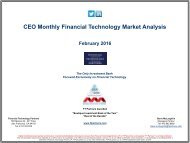Bitcoin and Cryptocurrency Technologies
1Qqc4BN
1Qqc4BN
You also want an ePaper? Increase the reach of your titles
YUMPU automatically turns print PDFs into web optimized ePapers that Google loves.
Let’s walk through an example that should make the concepts behind prediction markets more clear.<br />
The 2014 World Cup was held in Brazil. Suppose there was a market where you could buy <strong>and</strong> sell<br />
shares associated with each team, <strong>and</strong> the shares for the team that wins will ultimately be worth 1<br />
dollar <strong>and</strong> all the other shares are worth 0. Going into the tournament, every team would start out<br />
with some nonzero price, based on what the market believes their chances of winning are. Examples<br />
are shown in Table 9.12 for five different teams.<br />
In the pre‐tournament phase, Germany shares are trading for about 12 cents, which means that the<br />
market roughly believes Germany has a 12% chance of winning. As the tournament progresses, these<br />
prices will fluctuate, reflecting how the market participants adjust their beliefs of how likely each<br />
team is to win.<br />
In our example, Engl<strong>and</strong> was initially trading at five cents but went to zero after the group stage.<br />
That’s because Engl<strong>and</strong> was knocked out in the group stage. There's no longer any way for them to<br />
win, <strong>and</strong> the price reflects that; their shares are now worthless. On the other h<strong>and</strong>, the U.S. team that<br />
was initially thought to have a very poor chance of surviving the group stage turned out to do very<br />
well. If you had thought to buy U.S. shares in the beginning when they were very cheap (one cent),<br />
you could sell them immediately after the group stage for six cents. You’d get back six times the<br />
money you bet. You wouldn't have to wait until after the end of the tournament to make a profit.<br />
Even though the U.S. team didn’t end up winning the tournament, you’d be able to profit from the<br />
fact that you anticipated a change in beliefs about their chances of winning after their strong<br />
performance in the group stage.<br />
When we get to the semifinals, there are only four teams left. U.S. <strong>and</strong> Engl<strong>and</strong> were knocked out so<br />
their share prices have already gone to zero. Now every remaining team has a relatively high price,<br />
<strong>and</strong> their share prices should add up to 1.0. Brazil in particular was favored to win, <strong>and</strong> thus had the<br />
highest price. In fact, Brazil lost in the semifinals <strong>and</strong> their share price went to zero. Within the span of<br />
a couple of hours, the market’s beliefs changed dramatically. You would have been able to profit in a<br />
very short time frame if you were confident going in to the match that Brazil was overrated; you could<br />
take a “short position” on Brazil <strong>and</strong>/or bet on the other teams.<br />
Going into the finals there are only two teams left <strong>and</strong> their shares again add up to 1.0. At the very<br />
end of the tournament, of course, the only shares that finally have any value are those of the German<br />
team since they ended up winning.<br />
Obviously, one way you could have made a profit would have been to buy shares in Germany at the<br />
beginning for 12 cents <strong>and</strong> hold them all the way to to the end. This is basically how traditional sports<br />
betting works — you place a bet before the tournament starts <strong>and</strong> collect the payout after the end of<br />
the tournament. However, in a prediction market, there are many other ways to play <strong>and</strong> to profit.<br />
You can invest in any team at any time, <strong>and</strong> you can profit solely on the ability to predict that people's<br />
beliefs will change, regardless of the final outcome.<br />
258









